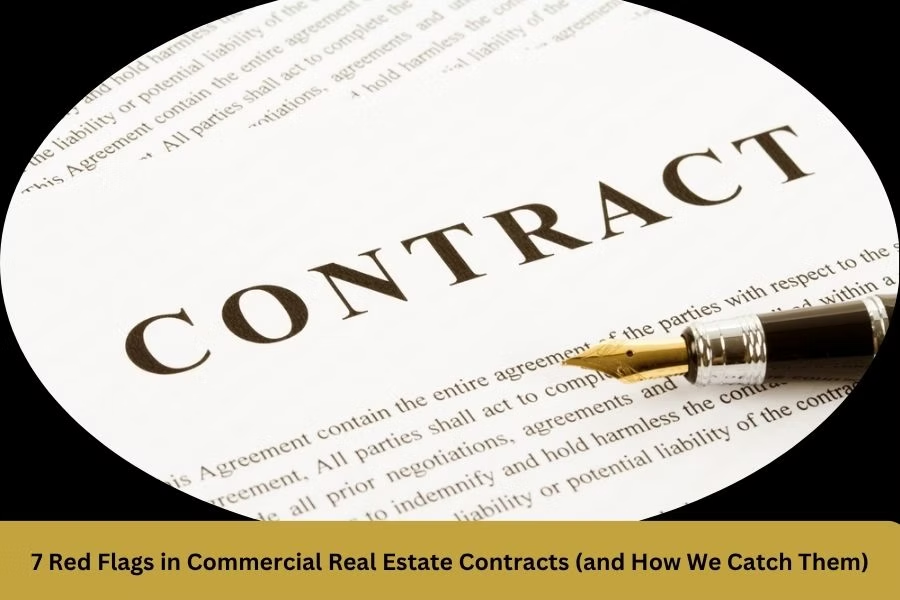Commercial real estate contracts are the foundation of multi-million-dollar transactions. But beneath the surface of any agreement lies a maze of clauses, conditions, and obligations—any of which can jeopardize your investment or derail your project if overlooked.
At The Real Estate Law Firm, we’ve reviewed thousands of contracts and know exactly where problems tend to hide. In this guide, we’ll expose seven red flags commonly found in commercial real estate contracts—and show you how The Real Estate Law Firm catches them before they become costly mistakes.
Plan your commercial assets with estate security in mind.
1. Vague or Ambiguous Language
Why it’s a red flag: Contracts should leave no room for interpretation. Ambiguities in phrases like “reasonable time,” “satisfactory condition,” or “subject to agreement” create uncertainty that can be exploited by either party later.
How we catch it: At The Real Estate Law Firm, we scrutinize every clause for clarity. We either redefine vague terms or replace them with objective, measurable language that stands up in court. Our approach ensures all parties know exactly what’s expected—and when.
2. Unclear Contingency Clauses
Why it’s a red flag: Contingencies allow buyers or sellers to back out of a deal under certain conditions—such as financing, zoning approvals, or environmental assessments. When these are unclear, they may be unenforceable or create unwanted loopholes.
How we catch it: We ensure contingency clauses are tightly drafted with clear timelines and definitions. At The Real Estate Law Firm, we often add specific language about when a contingency is triggered, how it must be satisfied, and what happens if it isn’t.
3. Hidden Maintenance or Repair Obligations
Why it’s a red flag: Some contracts shift the burden of future maintenance, repairs, or compliance with local codes entirely to the buyer—often hidden in complex leaseback or sale-lease agreements.
How we catch it: We review every clause that relates to “property condition,” “compliance,” and “ongoing obligations.” At The Real Estate Law Firm, we push for fair apportionment of costs, pre-sale inspections, and escrow holdbacks when needed.
4. Incomplete Title or Ownership Disclosures
Why it’s a red flag: If a seller doesn’t fully disclose liens, easements, or ownership rights, it can delay or completely void a transaction. Even worse, the buyer may assume liabilities unknowingly.
Talk to our team about zoning and land use.
How we catch it: We always conduct independent title searches and require updated title insurance. At The Real Estate Law Firm, we work directly with title companies and ensure all disclosures are made upfront and confirmed before closing.
5. Poorly Defined Use Restrictions or Zoning Assumptions
Why it’s a red flag: Many commercial real estate contracts assume the buyer can use the property for a specific purpose, like retail or industrial. However, the local zoning laws or existing covenants may not allow it.
How we catch it: Our team performs a detailed zoning and land-use review. The Real Estate Law Firm checks not only municipal codes but also HOA covenants and recorded restrictions to ensure your intended use aligns with legal parameters.
6. Dispute Resolution Clauses Favoring One Party
Why it’s a red flag: Clauses that mandate arbitration in a distant state or apply unfamiliar laws can disadvantage one party significantly. Similarly, limitations on legal remedies can restrict your rights if something goes wrong.
How we catch it: The Real Estate Law Firm negotiates fair dispute resolution provisions that allow for mediation or litigation in your local jurisdiction. We also ensure that no party waives essential legal rights unknowingly.
7. Lack of Exit Clauses or Termination Rights
Why it’s a red flag: If you need to cancel the contract due to financing failure, environmental risks, or legal impediments, an ironclad contract without exit rights can leave you locked into a bad deal.
How we catch it: We always advocate for well-defined termination rights. The Real Estate Law Firm builds flexible exit strategies into every agreement, including refundable deposits or walk-away clauses in justified situations.
Conclusion: Preventing Costly Mistakes Before They Happen
Commercial real estate contracts are complex—and sometimes intentionally so. But with careful review and strong legal representation, you can spot and neutralize red flags before they compromise your deal.
The Real Estate Law Firm is trusted by commercial investors, developers, and corporate buyers for one reason—we know where the traps are, and we know how to avoid them. Our proactive approach has saved our clients millions and ensured smoother closings, every time.
If you’re entering into a commercial real estate transaction, let us be your legal eyes. Before you sign, let The Real Estate Law Firm review your contract line by line—for peace of mind and protection you can count on.
Need clarity in contingencies? Contact our legal team.
FAQs: 7 Red Flags in Commercial Real Estate Contracts
-
What is considered a red flag in a commercial real estate contract?
A red flag is any clause or omission that could expose a party to unexpected legal, financial, or operational risk. -
How can ambiguous language in a contract hurt me?
It creates room for disputes. Ambiguity can be used against you if another party interprets the contract differently than you intended. -
Why is it important to review contingency clauses carefully?
Without clear contingencies, you may lose your deposit or be forced to close even if conditions aren’t met. -
What kind of obligations can be hidden in a real estate contract?
Maintenance, repairs, compliance with code, or environmental cleanup can all be subtly passed to the buyer. -
Can a contract still be valid if title issues are discovered later?
Yes, but it can lead to legal disputes, delayed closings, or financial losses. That’s why full title review is essential. -
How do zoning issues affect my commercial purchase?
You may not be able to use the property as intended, which could destroy the business case for the purchase. -
What should I do if a dispute resolution clause seems unfair?
Negotiate! A good lawyer like those at The Real Estate Law Firm can revise it to protect your interests. -
Is it common for contracts to exclude exit options?
Some contracts—especially those written by the seller—may intentionally omit them. That’s a red flag. -
How can I protect myself from post-closing surprises?
Hire a real estate attorney, conduct due diligence, and ensure every risk is accounted for in the agreement. -
What makes The Real Estate Law Firm different?
We specialize solely in real estate law. Our detailed contract reviews, due diligence processes, and proactive legal strategy are designed to protect your investment from day one.




